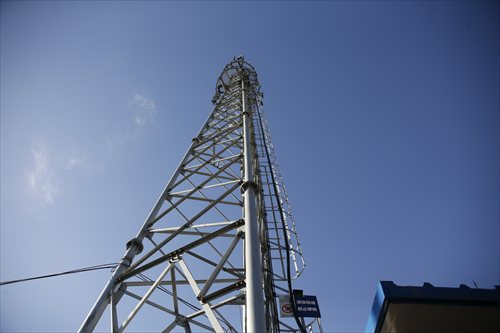HOME >> METRO SHANGHAI
Illegal broadcasters clutter up the city’s airwaves with lewd commercials
By Wang Han Source:Global Times Published: 2016-1-13 18:18:01

Some unlicensed radio station operators secretly put equipment on established communication towers to strengthen signals. Photo: CFP
"I was listening in my car to a radio program on my way home at about 1 am when suddenly I heard a commercial for sexual performance enhancers being openly broadcast. I was astounded that midnight radio programs had become so vulgar. But at that time I didn't realize the commercial was actually being put to air by an illegal radio station," said Mr Tang, a Shanghai resident who usually works night shifts.
Mr Tang is not alone in being upset at what he heard on the radio. Many Shanghai people report having their favorite radio programs interrupted with inappropriate and often racy commercials for medications promising to treat erectile dysfunction or to enhance sexual prowess. Since 2015 the number of illegal radio stations broadcasting in Shanghai has been on the increase.
These illegal, or pirate radio stations usually operate from rented rooms in high-rise buildings and it can be hard to tell them apart from legitimate stations. According to the Shanghai Radio Administration Bureau, illegal radio stations usually have similar frequencies and often content to the licensed operators. They have announcers, hosts, experts and phone-in segments - 89.4MHz, one of the pirate stations, takes calls from listeners overnight.
High returns
A lot of these pirate stations have been making huge profits by broadcasting pornographic programs - it's a low-investment-quick-profit business. Radio transmitters that can make these broadcasts only cost between 10,000 yuan ($1,521) and 30,000 yuan. These stations reportedly charge 1,000 yuan an hour for broadcasting commercials for sexual health products. A station broadcasting 24 hours a day could be making about 20,000 yuan.
And operating one of these pirate radio stations is easy. The equipment fits into a rented room and an antenna is placed outside the windows - using timers and remote controls no one actually needs to be where the transmitting equipment is.
Pan Hongyou, an expert in radio management, said that an antenna and a powerful transmitter were all that was needed to run a pirate radio station.
Radio transmitters are widely available online, and with this equipment, operators can easily transmit pre-recorded programs to audiences that could number in the millions.
"This magic pill and this mystery therapy will bring happiness to all women." This is the style of a typical commercial on a pirate station. Most of these commercials are heard from midnight and the target audience is obviously adults and senior men.
But behind the commercials are a profitable chain of drug manufacturers, illegal radio operators, program hosts, fake doctors and experts, and pretend patients.
These radio programs tend to have the same pattern. First, a "famous doctor" is invited to take part in the program, and then the host introduces products and talks to listeners in phone-in sessions. The phone lines are always busy, and listeners seek help from the doctor by describing their sex lives in intimate and pornographic detail.
It is also noteworthy that the "doctors" on these programs usually claim that the preparations they prescribe are from secret formulas handed down to them by their ancestors. There is always a discount if people buy the medications within a certain time frame - and the best bargain can be had right now. But then they say that again the following night.
Most of the drugs sold through these radio stations are fake or counterfeit and the "doctors" are actors as indeed are many of the listeners who phone in.
In 2010, the State Administration of Press, Publication, Radio, Film, and Television banned the advertising of sex-related health products and medical treatments on licensed radio stations. Since then this type of commercial has all but vanished from legitimate radio broadcasts.
With no way to advertise on legal platforms, a few businessmen turned to unlicensed radio broadcasters for help, and the demand for these services has seen the mushrooming of the illegal radio stations in the city.
Safety threat
As well as upsetting unprepared listeners there are serious potential dangers involved with these broadcasters, which can pose a threat to civil aviation communications, along with emergency service radio bands.
On January 9, 2015 four Chinese flights trying to land at a Dalian airport experienced interference from local illegal radio stations. The flights were forced to land even though the pilots could not rely on the communication systems, which had been seriously affected.
In 2014, Okay Airways complained to the radio authority in Tianjin that an unlicensed broadcaster was using a frequency that was reserved for ground control's communication with the airline's aircraft, putting aircraft taking off and landing at risk.
An industry expert explained: "The radius of interference created by a pirate radio station's broadcasts can stretch to about 300 kilometers and this is exactly the range for most take-offs and landings, which are the most hazardous parts of a flight."
Chen Jianguo, an experienced air traffic controller, said: "Though most illegal broadcasters use citizens band radio, some fail to send signals accurately, so sometimes clutter can interfere with the frequency used by airplanes."
He said that when pilots communicated with air traffic controllers on the ground, they sometimes heard broadcasts of irrelevant chat and commercials from local pirate radio stations. "Radio interference like this could interrupt normal aviation communications. If pilots can't hear ground controllers clearly, it increases the risk of accidents."

Some unlicensed radio station operators secretly put equipment on established communication towers to strengthen signals. Photo: IC
Hard to track
But tracking down pirate radio stations is difficult. "Since these offenders tend to use remote terminals to operate their transmitters, and use fake ID cards to rent rooms, it is rather hard to catch them in action," said a law enforcement officer. He said while a 24-hour pirate radio station can operate with just a USB flash drive, a radio transmitter, and an aerial, it takes law enforcement officers a long time to fix an exact location of a transmitter.
Despite the difficulties in 2015 the Shanghai Radio Administration Bureau and Shanghai police successfully tracked down 18 pirate radio stations and confiscated their transmitters. And in 2016, the bureau will continue to chase pirate radio operators.
Under China's radio laws, the current punishment for operating an unlicensed radio station is the confiscation of the equipment and a fine of up to 5,000 yuan.
These regulations were introduced in 1993 but in the past 22 years the technology and the viability of illegal radio broadcasting has changed dramatically. In September 2015 the Ministry of Industry and Information Technology of the People's Republic of China said it would revise the current radio regulations, and increase the maximum fine to 20,000 yuan.
Compiled by Wang Han based on reports in thepaper.cn, the Oriental Morning Post and xinhuanet.com
Newspaper headline: The porn radio pirates
Posted in: Metro Shanghai, City Panorama